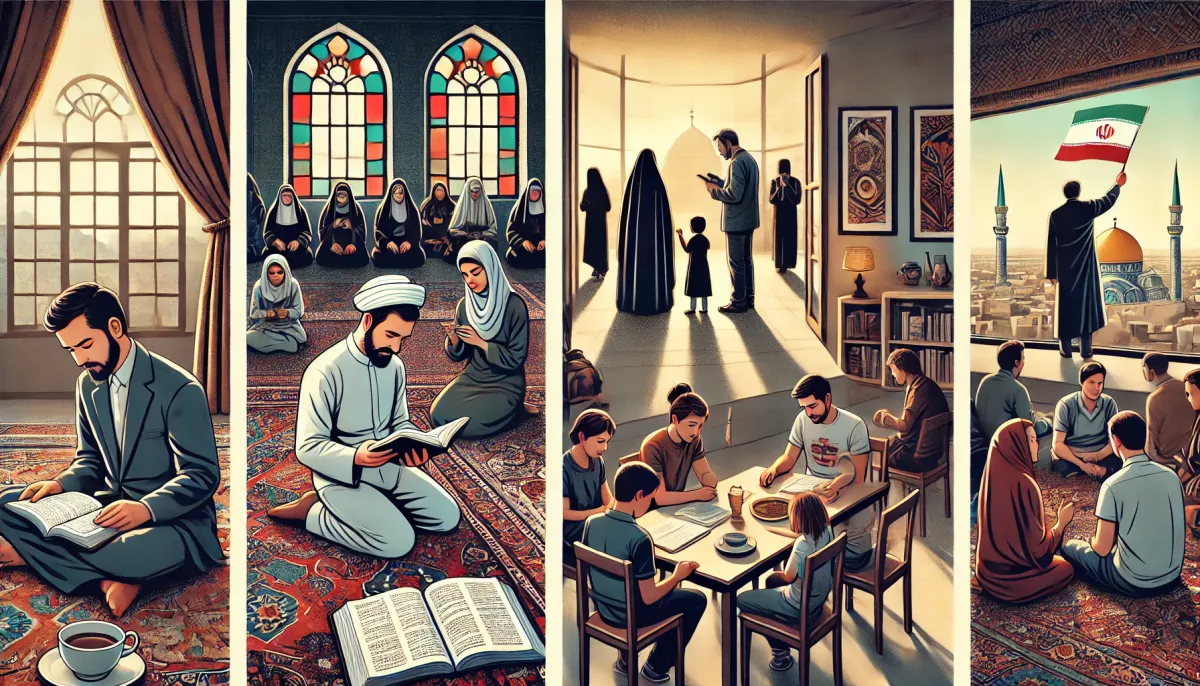

By Dr. Tim Orr
Discipleship, the process of following Jesus and growing in faith, presents unique challenges depending on the cultural, social, and political context. For Iranian Christians, these challenges are distinctively shaped by their environment—whether they are in Iran, the UK, or the US. While all three locations offer a different backdrop, Iranian Christians face significant obstacles in each, ranging from severe persecution to cultural adaptation. Addressing these challenges with a gospel-centered approach can provide a solid foundation for discipleship, offering hope and guidance amidst adversity.
In Iran, the most pressing challenge for discipleship among Christians is the severe political and religious persecution. The Iranian government is a strict Islamic theocracy that views conversion from Islam to Christianity as apostasy, punishable by imprisonment, torture, and even death. Christians, particularly converts from Islam, are often subjected to harassment, surveillance, and arbitrary arrest. These conditions make it extremely dangerous for believers to gather, worship openly, or engage in traditional discipleship practices. For instance, a former Muslim convert, Reza, who now follows Christ, shared his experience of being arrested for attending a house church meeting. He was held in solitary confinement for weeks, interrogated, and beaten for his faith. Despite his release, Reza continues to live in fear of rearrest, making consistent discipleship and community-building nearly impossible. This persecution forces many Iranian Christians to practice their faith in secrecy, often in underground house churches. The fear of discovery limits their ability to access resources, receive formal theological training, or participate in consistent discipleship programs. This environment also hampers the ability to foster strong, accountable relationships that are essential for spiritual growth.
Beyond legal repercussions, Iranian Christians face significant social ostracism. Converts from Islam can be disowned by their families and shunned by their communities, which deeply affects their social support systems. This isolation can lead to emotional and psychological challenges, as new believers struggle with loneliness and the loss of their cultural and familial identity. For example, Maryam, a young woman who converted to Christianity, was rejected by her family when they discovered her faith. Isolated from her community and living with the constant fear of betrayal, Maryam finds it challenging to build trust and engage in discipleship activities that require openness and vulnerability. Due to governmental restrictions, there is a scarcity of Christian literature, Bibles, and discipleship materials in Farsi, the primary language spoken in Iran. Even digital resources are difficult to access due to internet censorship and surveillance. The lack of trained leaders further exacerbates this issue, as many pastors are either imprisoned or have fled the country, creating a leadership vacuum within the underground church.
Cultural Adaptation and Identity Crisis: Discipleship Challenges in the UK
For Iranian Christians who have relocated to the UK, the challenges of discipleship shift from persecution to cultural adaptation. In a secular and multicultural society like the UK, Iranian Christians often find themselves navigating a complex landscape of cultural diversity and religious pluralism. While they enjoy religious freedom, the contrast between their experiences in Iran and the relatively open society of the UK can be overwhelming. Many Iranian Christians struggle to integrate into local churches due to cultural differences and language barriers. They may find that worship styles, theological emphases, and community dynamics in UK churches differ significantly from what they are accustomed to. This can create a sense of disconnection, making it difficult for them to engage in discipleship activities fully. For instance, Ali, an Iranian believer now living in London, shared that he often feels lost in the contemporary worship settings common in British churches. He longs for the more traditional, liturgical style of worship he was used to in Iran but finds it hard to connect in the more informal and spontaneous UK church environment.
In the UK, Iranian Christians often face an identity crisis. They may feel torn between their Iranian heritage and the new cultural environment they find themselves in. This tension can impact their discipleship journey as they grapple with questions of belonging, cultural identity, and how to express their faith in a way that honors their background and new context. Additionally, the Iranian diaspora community in the UK is diverse, with varying levels of integration and religious commitment. This diversity can make it challenging for Iranian Christians to find a cohesive community where they can grow in their faith and receive discipleship support. For example, Nazanin, an Iranian Christian living in Manchester, is caught between her Iranian cultural roots and the Western influences she encounters in her new church community. This tension has made her feel like an outsider in both contexts, impacting her ability to engage fully in discipleship. Many Iranian Christians in the UK are asylum seekers or refugees who have fled persecution. The trauma of their past experiences and the stress of adjusting to a new country can hinder their ability to participate fully in discipleship. They may require additional pastoral care, counseling, and support to address these emotional and psychological wounds essential for holistic discipleship.
Navigating the Complexities of Assimilation: Discipleship for Iranian Christians in the US
For Iranian Christians in the US, the primary challenges revolve around cultural differences and the process of assimilation. The US church landscape is vast and varied, ranging from conservative evangelical congregations to more progressive communities. This diversity can confuse Iranian Christians, who may struggle to find a church community that aligns with their theological views and worship preferences. Language barriers can also pose a significant challenge, especially for those not fluent in English. This can make it difficult for them to engage in discipleship programs, participate in Bible studies, or fully integrate into church life.
The US church culture often emphasizes individualism and a personal relationship with Jesus, which differs from the more communal and collective approach familiar to many Iranian Christians. This theological difference can create misunderstandings or feelings of alienation, making it difficult for Iranian believers to connect with their American counterparts and engage fully in discipleship. Furthermore, Iranian Christians may bring unique theological questions and perspectives shaped by their experiences in Iran. American churches may not always be equipped to address these specific needs, leading to discipleship and spiritual growth gaps. While the US offers religious freedom, the emphasis on cultural assimilation can create pressure for Iranian Christians to conform to American norms. This can lead to cultural identity and heritage loss, often closely tied to their faith experience. Balancing their Iranian background with the cultural expectations of American churches can be a delicate process, requiring sensitivity and understanding from church leaders and fellow believers.
A Gospel-Centered Approach to Overcoming Discipleship Challenges Across Contexts
Despite the diverse challenges Iranian Christians face in Iran, the UK, and the US, a gospel-centered approach to discipleship can provide a unifying foundation for growth and transformation. This approach focuses on the core message of the Gospel—the life, death, and resurrection of Jesus Christ—and its implications for every aspect of life. A gospel-centered approach to discipleship places Jesus at the center of the believer’s journey, emphasizing His role as Savior, Lord, and model for life. For Iranian Christians, this means understanding that their identity is rooted in Christ, not in cultural or national distinctions. This focus helps believers navigate the challenges of cultural adaptation and persecution by grounding them in the unchanging truth of the Gospel. In the context of persecution, such as in Iran, a gospel-centered approach reminds believers that their ultimate allegiance is to Christ, who also suffered for His faithfulness to God. This perspective can provide comfort and strength, knowing that their suffering is not in vain but is part of sharing in Christ’s sufferings. In practical terms, this might mean emphasizing the narratives of Jesus' suffering and persecution in Bible studies or sermons, helping Iranian Christians see their own experiences in light of the greater narrative of Christ's redemptive work.
For discipleship to be effective, it must be rooted in a solid understanding of Scripture. A gospel-centered approach encourages Iranian Christians to immerse themselves in the Bible, understanding its teachings, promises, and commands. This foundation is crucial, especially in environments with limited access to biblical teaching, such as Iran. For example, underground church leaders in Iran often use digital platforms like encrypted messaging apps to share Bible verses and study guides, fostering a virtual community of learning and support despite the physical dangers. By focusing on the core tenets of the Christian faith, discipleship can transcend cultural differences, whether in the UK or the US. Understanding the narrative of redemption, the doctrines of grace, and the nature of the church helps believers navigate different theological and cultural landscapes.
Discipleship thrives in a community where believers can encourage, support, and hold each other accountable. A gospel-centered approach emphasizes the importance of fellowship, even when the gathering is risky. In Iran, this might mean small, secretive meetings, while in the UK and the US, it might involve culturally sensitive church groups that respect Iranian traditions. Creating spaces where Iranian Christians feel understood and valued is crucial. This includes offering language support, culturally relevant worship, and opportunities for shared learning. Building such communities helps mitigate feelings of isolation and provides a support network for spiritual growth. For instance, some churches in the UK have started Farsi-speaking Bible study groups, allowing Iranian Christians to engage with the Scriptures in their native language and connect with others who share similar cultural backgrounds.
A gospel-centered approach recognizes the holistic nature of discipleship, addressing spiritual growth and emotional and psychological well-being. Many Iranian Christians carry deep wounds from persecution, displacement, and cultural dislocation. Providing pastoral care, counseling, and a safe healing space is essential to discipleship. In the UK and the US, churches can play a pivotal role in offering support and resources to help Iranian Christians navigate the challenges of their new environments. By understanding their unique experiences and offering compassionate care, churches can help believers integrate into the community and continue their discipleship journey. Churches can collaborate with Christian counseling services to provide trauma-informed care tailored to the specific experiences of Iranian Christians, helping them process their past while looking forward to a hopeful future in Christ.
The Gospel calls all believers to be witnesses, sharing the message of Christ with others. A gospel-centered approach equips Iranian Christians to share their faith, even in hostile environments. In Iran, this might involve quiet, relational evangelism, while in the UK and the US, it could mean engaging with the broader community through service and dialogue. Encouraging Iranian Christians to see their unique position as a bridge between cultures can empower them to be effective witnesses. By equipping them with the tools and confidence to share their faith, discipleship becomes about personal growth and impacting others for Christ. For example, in the US, Iranian Christians might participate in interfaith dialogues or community service projects that allow them to share their testimony and demonstrate Christ’s love in action, building bridges across cultural divides.
Tim Orr is a scholar, Evangelical minister, conference speaker, and interfaith consultant with over 30 years of experience in cross-cultural ministry. He holds six degrees, including a master’s in Islamic studies from the Islamic College in London. Tim taught Religious Studies for 15 years at Indiana University Columbus and is now a Congregations and Polarization Project research associate at the Center for the Study of Religion and American Culture at Indiana University Indianapolis. He has spoken at universities, including Oxford University, the University of Tehran, and mosques throughout the U.K. His research focuses on American Evangelicalism, Islamic antisemitism, and Islamic feminism, and he has published widely, including articles in Islamic peer-reviewed journals and three books.
 YouTube
YouTube
Sign up for Dr. Tim Orr's Blog
Dr. Tim Orr isn't just your average academic—he's a passionate advocate for interreligious dialogue, a seasoned academic, and an ordained Evangelical minister with a unique vision.
No spam. Unsubscribe anytime.
